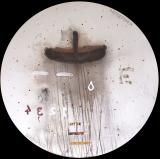26/7 - 8/9/2019
El libro del agua
Joanpere Massana
Ponts (Lleida), 1968
Joanpere Massana He has a degree in Fine Arts in the specialty of Sculpture from the Faculty of Fine Arts "San Jorge" in Barcelona. Professor of Volume and Coordinator of the Department of Volume at the Ondara Tàrrega Higher School of Art and Design, Art Advisor at the Institute of Ilerdenses Studies Diputación de Lleida.
With the title "The book of water" Joanpere Massana marks the beginning of a series that begins its exhibition tour in the Palazzo delle Arti Napoli, to continue in the Pinacoteca de Jesi (Italy) and follow the rest of Europe in the form of individual exhibitions , collectives, fairs and facilities. Abartium presents in this exhibition, a selection of 7 cataloged works of small and medium format on paper and wood.
"The fourth dimension, time, plays an important role in" The book of water "where there are innumerable references to the running of water and therefore of time: traces of people who have passed or worn stones from running the rivers. ( ...) It represents, in fact, a trip by rivers and in the open sea.It is dedicated to the link between the artist's homeland and the place of the first-shows through the cultural reality of the Mediterranean that combines Catalonia in the city of Naples. (...) Massana's material painting, without the figurative elements cited above, develops gestures and generous signs that transposed in an emotional abstractism clearly derived from the tradition of the report.On the other hand, the narrative aspect of Massana's work links it to the original Transvarguarda, a campaign that develops an imaginary between myth and fantasy, often referring to primary interests, such as space, time and history. "
Julia Draganovic, Director of the Palazzo delle Arti Napoli
"The Segre like the Esino, vessels and scrubs, rods and fish, quarries and orchards, closed and round, water thieves and shore killers. Water as an expression and origin of civilization. Without a river or a fountain there is no human settlement, there is no grazing or agriculture, there is no craftsmanship, essential as sunlight, indispensable as the alternation between day and night, water corresponds to the primary need of thirst (of men and fields) and the river constitutes the primitive course of connection between territories and civilization.As a nervous termination it relates human groups that would otherwise be destined to be isolated, transports seeds and pollen, adds cohesion between otherwise hostile populations between them. water transports languages, eating habits, sumptuous images, technology, modes of expression. ",
Loretta Mozzoni, Director of the Jesi Gallery.
- BONART (link)
- ARTEINFORMADO (link)
- LA MAÑANA (link)






